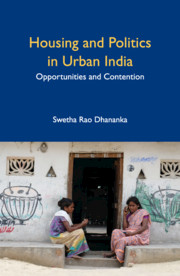Book contents
- Frontmatter
- Dedication
- Contents
- List of Figures
- List of Tables and Box
- Acknowledgements
- List of Abbreviations
- 1 Claiming Adequate Housing in Urban India: An Introduction
- 2 Indian Democracy: Normative Prescriptions and Everyday Practices
- 3 Governmentality of Housing and the Politics of Access
- 4 Mobilization on Behalf of the Urban Poor
- 5 Mobilizations by the Urban Poor
- 6 Claiming Housing despite Indian Politics and Governance
- Epilogue
- Bibliography
- Index
1 - Claiming Adequate Housing in Urban India: An Introduction
Published online by Cambridge University Press: 30 April 2020
- Frontmatter
- Dedication
- Contents
- List of Figures
- List of Tables and Box
- Acknowledgements
- List of Abbreviations
- 1 Claiming Adequate Housing in Urban India: An Introduction
- 2 Indian Democracy: Normative Prescriptions and Everyday Practices
- 3 Governmentality of Housing and the Politics of Access
- 4 Mobilization on Behalf of the Urban Poor
- 5 Mobilizations by the Urban Poor
- 6 Claiming Housing despite Indian Politics and Governance
- Epilogue
- Bibliography
- Index
Summary
Mahesh got a call. A 40-year-old slum in the heart of the south Indian city of Bangalore (officially known as Bengaluru) was to be demolished the next day to make way for the upcoming metro tracks. Mahesh – a slum-dweller himself – and his fellow activists hurried to the site. It was a race against time to gain the trust of 48 families and to convince them to resist taking the compensation of $1,100 and not to vacate the land. Within three days, the mobilizers got the documentation ready and sent it out to the Legal Board, the Governor, the Chief Minister, and the Human Rights Commission. They demanded that the Metro Corporation explain how they could displace these families without notice, when the rich were getting compensated for every inch of land. The justification of the Corporation was that these families were occupying that land illegally. Calling upon their humanity, the activists managed to buy 15 days’ time. Within this grace period, the mobilizers along with the community managed to get a preliminary slum declaration sealed. This meant that the state had recognized that their ‘dwelling was unfit for human habitation’ and that their situation was to be improved. The Metro Corporation offered to double the compensation amount if they vacated immediately. The activists brought to their attention that the metro implementation guidelines demanded housing for the displaced communities be ready before vacating the land. So, the community remained there for the next one and a half years until they were rehoused in a mass social housing unit complex at the periphery of the city, for which competing urban poor communities were squatting in front of the complex to claim units for themselves.
I asked Mahesh if he was satisfied with the trajectory of the mobilization against the Metro Corporation. He answered that it had just contributed to reproducing the same patterns that were upheld since centuries in India, namely to keep the poor and lower caste communities out! While community members at first were fascinated by the brick and mortar unit and urban services, they were soon to realize the cost of rebuilding their lives at the margin of the city of never-ending IT codes, metro-tracks, and glorious temples of consumerism for the 1 per cent club. Now they were supposed to service the city from the margins.
- Type
- Chapter
- Information
- Housing and Politics in Urban IndiaOpportunities and Contention, pp. 1 - 27Publisher: Cambridge University PressPrint publication year: 2020



